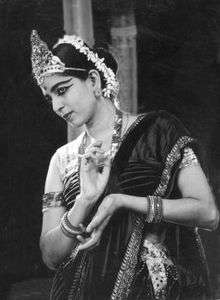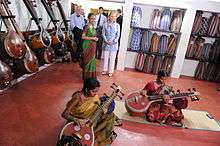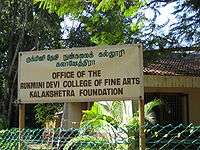Kalakshetra Foundation
| Kalakshetra Foundation | |
|---|---|
 | |
| Location | |
| Besant Nagar, Chennai, India | |
| Coordinates | 12°59′17″N 80°15′54″E / 12.9881°N 80.26500°ECoordinates: 12°59′17″N 80°15′54″E / 12.9881°N 80.26500°E |
| Information | |
| Established | January 1936 |
| Founder | Rukmini Devi Arundale |
| Chairperson | N. Gopalaswami (2014-present)[1] |
| Director | Revathi Ramachandran (2018 - )https://www.thehindu.com/news/national/tamil-nadu/revathi-ramachandran-to-be-kalakshetra-director/article23395879.ece |
| Website |
www |
Kalakshetra Foundation, formerly simply Kalakshetra,[2] is an arts and cultural academy dedicated to the preservation of traditional values in Indian art and crafts, especially in the field of Bharatanatyam dance and Gandharvaveda music. Based in Chennai, India, the academy was founded in January 1936 by Rukmini Devi Neelakanta Sastri and her husband Arundale. Under Arundale's guidance, the institution achieved national and international recognition for its unique style and perfectionism. In 1962, Kalakshetra moved to a new campus in Besant Nagar, Chennai, occupying 40 hectares (99 acres) of land.[3]
In January 1994, an Act of the Parliament of India recognised the Kalakshetra Foundation as an "Institute of National Importance."[4][5]
History


Kalakshetra, later known as the Kalakshetra Foundation, was established by Rukmini Devi Arundale, along with her husband, George Arundale, a well-known theosophist, in Adyar, Chennai, in 1936. She invited not only the best students but also noted teachers, musicians and artists to be a part of this institution.[6]
Year-long celebrations, including lectures, seminars and festivals marked her 100th birth anniversary, on February 29, 2004, at Kalakshetra and elsewhere in many parts of the world.[7] Also on February 29, a photo exhibition on her life opened at the Lalit Kala Gallery in New Delhi, and President A. P. J. Abdul Kalam released a photo-biography, written and compiled by Sunil Kothari, with a foreword by former president Ramaswamy Venkataraman.[8][9][10] In 2016, marking its 80th year, the Kalakshetra Foundation held a 'Remembering Rukmini Devi’ festival of music and dance.[11]
Kalakshetra style
Having studied the Pandanallur style for three years, in 1936 Rukmini Devi Arundale started working on developing her own, Kalakshetra, style of Bharatanatyam. She introduced group performances and staged various Bharatanatyam-based ballets.
.jpg)
The Kalakshetra style is noted for its angular, straight, ballet-like kinesthetics, and its avoidance of Recakas and of the uninhibited throw (Ksepa) of the limbs.
According to Sankara Menon (1907–2007), who was her associate from Kalakshetra’s beginnings,[12] Rukmini Devi raised Bharatanatyam to a puritan art form, divorced from its recently controversial past by "removing objectionable elements" (mostly, the Sringara, certain emotional elements evocative of the erotic, such as hip, neck, lip and chest movements) from the Pandanallur style, which was publicly criticized by Indian dancer Tanjore Balasaraswati (1918–1984) and other representatives of Tamil Nadu's traditional Isai Velalar culture. Love outside parameters considered "chaste" was not to be portrayed. Balasaraswati said that "the effort to purify Bharatanatyam through the introduction of novel ideas is like putting a gloss on burnished gold or painting the lotus". Lawyer and classical artist E. Krishna Iyer (1897–1968) said about Rukmini Devi, “There is no need to say that before she entered the field, the art was dead and gone or that it saw a renaissance only when she started to dance or that she created anything new that was not there before”.
Institutes

- Rukmini Devi College of Fine Arts[13]
- Rukmini Devi Museum
- Koothambalam (Kalakshetra theatre)
- Craft Education and Research Centre (including the weaving department, the Kalamkari natural dye printing and the painting unit)
Notable alumni
Notable alumni include Radha Burnier, Kamaladevi Chattopadhyay, Sanjukta Panigrahi, C.V. Chandrasekhar, Dhananjayans, Adyar K. Lakshman, Jayashree Narayanan, Leela Samson,[14] Jaya Thyagarajan, Devoleena Bhattacharjee, and Ananda Shankar Jayant.[15]
References
- ↑ "Ex-CEC Gopalaswami new chairman of Kalakshetra Foundation". The Hindu. October 22, 2014. Retrieved 2016-03-30.
- ↑ "About Kalakshetra / History". Kalakshetra Foundation. Retrieved 15 July 2017.
- ↑ "Kalashethra", The New York Times, retrieved 2011-12-03
- ↑ Kalakshetra Foundation Act 1993 Archived 2010-02-15 at the Wayback Machine., Ministry of Law And Justice.
- ↑ "chennaibest.com".
- ↑ "Early years of Kalakshetra". www.tamilnation.org.
- ↑ "Another centenary celebration". The Hindu. January 27, 2003.
- ↑ "Her spirit still reigns". The Hindu. February 22, 2004.
- ↑ "Time to celebrate". The Hindu. February 27, 2003.
- ↑ Centenary celebrations nartaki.com
- ↑ Santhanam, Radhika (February 25, 2016). "Kalakshetra celebrates its 80th year". The Hindu. Retrieved 2016-03-30.
- ↑ "Guru who inspired love (Sankara Menon's centenary at Kalakshetra)". The Hindu. September 28, 2007.
- ↑ "Kalakshetra lauded for signal contribution to fine arts". The Hindu. December 22, 2007.
- ↑ Noted students of Kalakshetra,Archived 2008-03-12 at the Wayback Machine.
- ↑ "Welcome". Anandashankarjayant.com. Retrieved 2012-08-03.
Bibliography
- Fredericks, Leo: Poet in Kalakshetra. Madras 1977
- Kalakshetra Foundation (Hrsg.): Kalakshetra Brochure
- Nachiappan, C.: Rukmini Devi, Bharata Natya. Kalakshetra Publications, Chennai 2003
- Nachiappan, C.: Rukmini Devi, Dance Drama. Kalakshetra Publications, Chennai 2003
- Ramani, Shakuntala: Sari, the Kalakshetra tradition. Kalakshetra Foundation, Chennai 2002
- Sarada, S.: Kalakshetra-Rukmini Devi, reminiscences. Kala Mandir Trust, Madras 1985
External links
| Wikimedia Commons has media related to Kalakshetra. |